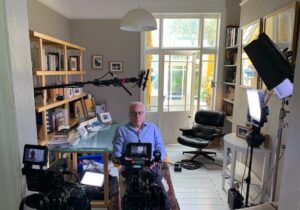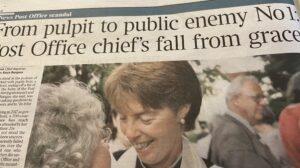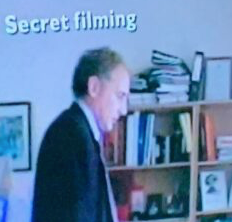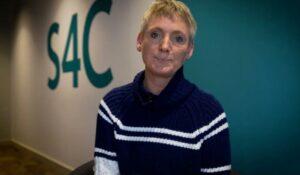- Death wish - 23rd February 2026
- Return to sender - 20th February 2026
- Legal eagle - 19th February 2026

As the fall-out continues after the airing of a hit television drama focusing on the huge Post Office (PO) IT scandal (where Wales features prominently), here we re-publish The Eye story from last month by our Editor, Phil Parry, about how hard it has apparently now become to say ‘sorry’ properly.
More than 700 sub-postmasters and mistresses were prosecuted based on data from faulty software (or because it allowed unauthorised access to computer records), between 1999 and 2015, with some going to prison for false accounting and theft, while many were financially ruined. There were four suicides.

The former PO head Paula Vennells handed back her CBE last week, but in a controversial statement appeared to minimise her own role, and blamed the IT system responsible – Fujitsu’s Horizon.
The star of the TV drama MR BATES VS THE POST OFFICE (actor Toby Jones) portrays the despair of former Llandudno sub-postmaster Alan Bates, as he reads that Ms Vennells had been given the honour originally, “for services to the Post Office…”. The transmission was filmed in North Wales.

It has now been revealed that her CBE was pushed through by Theresa May’s Government, DESPITE the fact that the honours committee raised concerns about the scandal.
Financial issues are also coming to the fore today, amid growing alarm that some of the innocent victims have yet to receive a penny in compensation.

Questions are being asked about how the PO’s books were signed off by external auditors, and as one of those wrongly accused said in the broadcast: “Where did the money go?!”.
Accountants from EY and PwC are braced to be put under the microscope at the public inquiry into it all.


It’s emerged that the PO may have underpaid more than £100 million in tax while overpaying its senior executives (like Ms Vennells).
Dan Neidle of Tax Policy Associates has proclaimed that the PO paid less tax by deducting payments to victims of the scandal from its profits.
Ms Vennells is also an ordained Anglican priest, and in 2017 was shortlisted to become Bishop of London, one of the Church of England’s (C of E) most senior positions.

In her statement as she returned the honour, Ms Vennells, who was PO Chief Executive Officer (CEO) between 2012 and 2019, said she had “listened” to the sub-postmasters and others, calling for her to return her CBE.
She declared: “I am truly sorry for the devastation caused to the sub-postmasters and their families, whose lives were torn apart by being wrongly accused and wrongly prosecuted as a result of the Horizon system”, and the decision generated enormous headlines both in the UK and abroad.
 Yet to her critics this is not a true apology at all, it is merely saying sorry that “devastation” was caused as “a result of the Horizon system”, which is entirely different.
Yet to her critics this is not a true apology at all, it is merely saying sorry that “devastation” was caused as “a result of the Horizon system”, which is entirely different.
She emphatically did NOT say ‘I am sorry for what I have done’.
It is claimed, however, that Ms Vennells bears responsibility for prolonging the torment of those who have been affected, and still faces questions about the receipt of bonuses worth £2.2 million.
This so-called ‘apology’, though, falls into a long tradition, which is explored in the following piece from December 4:


During 23 years with the BBC, and 40 years in journalism (when he was trained to use simple language, avoiding jargon), our Editor, Welshman Phil Parry has always been aware of key rules: that those caught out almost never say sorry; other people are to blame, and THEY are the real victims, so are NOT in the wrong.
These rules are put centre stage today by the Chief Executive Officer (CEO) of S4C who was sacked amid bullying allegations, saying she was victim of “an unprecedented lack of governance”, and that one of her prominent officials was also dismissed “following receipt of serious allegations about her conduct”, but claimed it was ‘unfair’.
 Previously he has described how he was helped to break into the South Wales Echo office car when he was a cub reporter, recalled his early career as a journalist, the importance of experience in the job, and made clear that the ‘calls’ to emergency services as well as court cases are central to any media operation.
Previously he has described how he was helped to break into the South Wales Echo office car when he was a cub reporter, recalled his early career as a journalist, the importance of experience in the job, and made clear that the ‘calls’ to emergency services as well as court cases are central to any media operation.
He has also explored how poorly paid most journalism is when trainee reporters had to live in squalid flats, the vital role of expenses, and about one of his most important stories on the now-scrapped 53 year-old BBC Cymru Wales (BBC CW) TV Current Affairs series, Week In Week Out (WIWO), which won an award even after it was axed, long after his career really took off.
Phil has explained too how crucial it is actually to speak to people, the virtue of speed as well as accuracy, why knowledge of ‘history’ is vital, how certain material was removed from TV Current Affairs programmes when secret cameras had to be used, and some of those he has interviewed.

Earlier he disclosed why investigative journalism is needed now more than ever although others have different opinions, and how information from trusted sources is crucial.
I have always found it extraordinary.
After months (sometimes years) of detailed research, the subjects would not only deny the facts (which I expected), but would invariably claim that THEY were the real victims!
Let me give you an example.


Many years ago (using secret filming), I confronted one individual with the evidence against him on a BBC Panorama, because I suspected this person of being a multiple murderer.
Instead of fessing up, expressing remorse, and offering condolences to the family and friends of his victims, he wanted to show how HE was the real victim, and that HE had been treated unfairly!
This case (one of many) has come to mind, along with how the golden rules of investigative journalism have been highlighted, after what we have witnessed.

I shouldn’t be surprised but I am!
Siân Doyle was Chief Executive Officer (CEO) of the Welsh fourth channel, S4C, but when she was off on ‘sick leave’ she was sacked, and she has bleated that she had been “dismissed by the Chairman of S4C, Rhodri Williams, in what I believe is an unprecedented lack of governance for a public body”.

She added: “I was dismissed by letter, without notice, without a meeting, without seeing a copy of the Capital Law report (on bullying in her former organisation) or any evidence, without a right of appeal, and without proper grounds”.
However the legal investigation into the “bullying and toxic culture” at her former organisation, took many months to compile, 96 people were spoken to, and it cost £350,000. Even so, Ms Doyle has claimed it is all “sinister”.


She defended herself pathetically in one petulant interview by saying: “Anonymous texts were sent to two of my management team saying that I was going to make them accountable for the report, that I was going to save my skin effectively and that I was going to throw them under the bus.
“Another one was sent to one of the production companies warning her off supporting me implying that they wouldn’t get any more commissions.”

Ms Doyle has cried that details of her predicament were leaked to the media beforehand, saying: “When my letter arrived to dismiss me on a Friday afternoon, I didn’t know that it was coming but the BBC knew and were planning the story before the email landed. If I had been driving I could have heard about my dismissal on the radio.
“The contents of my sick note from my doctor was only known by three people. But it was quoted directly by Martin Shipton in Nation Cymru (a nationalist website which is supported by the taxpayer).”

Then there is the unbelievable matter of her appointee, Llinos Griffin-Williams.
She was also dismissed from S4C (as ‘Chief Content Officer’), after just over a year and a half in the job following allegations of gross misconduct, but in a letter sent by her lawyers she said that she was left “utterly devastated” by her “unfair dismissal”.
Ms Griffin-Williams claims she was dismissed by Mr Williams, but that he had “acted unilaterally without the knowledge of the senior management team…and the S4C board”.

She has whined that she was “denied an opportunity to present evidence from the witnesses who were present (during the incident at the centre of it all) who refute the allegations made against me”, and a statement she has issued ends with the controversial claim that “two women in senior management roles at S4C” have made grievance complaints against Mr Williams.
Yet this action, too, only took place after a thorough inquiry into the facts of what happened.


Some may think now that there are serious questions to be faced by the Chair of S4C, Rhodri Williams (apart from those posed by Ms Doyle and Ms Griffin-Williams), on whose watch both these incredible events happened.
He did, after all, name Ms Doyle as CEO two years ago, and she was the one who then brought in Ms Griffin-Willliams.
But if he goes you can be sure that he is unlikely ‘i ddweud SORI’…
Details of Phil’s astonishing decades-long journalistic career (including his years in broadcasting, although NOT in S4C), as he was gripped by the rare and incurable neurological condition Hereditary Spastic Paraplegia (HSP), have been released in an important book ‘A GOOD STORY’. Order it now.
Regrettably publication of another book, however, was refused, because it was to have included names.

Tomorrow – why animal health experts have warned that a population of wild boar on the edge of Wales could be at risk because of unlawful human activity.









